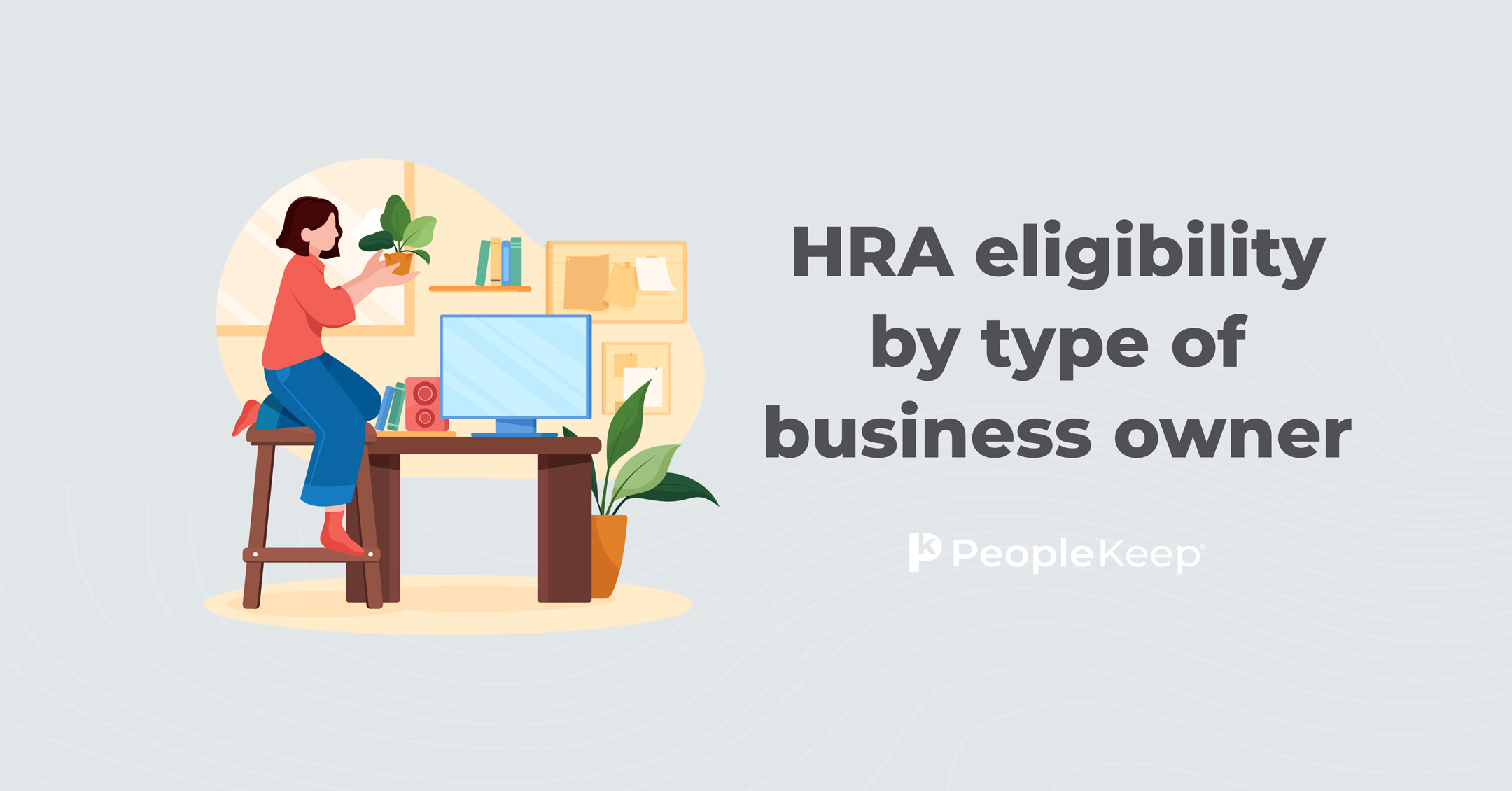Can a business pay for employees' individual health insurance plans?
By Holly Bengfort on May 14, 2024 at 9:58 AM
In today's ever-evolving workforce, business owners are constantly looking for new ways to attract and retain top talent. Instead of offering a costly group health plan, one tactic they may consider is offering to pay employees' individual health insurance costs.
While it may seem like a generous and attractive perk for employees, employers need to consider several factors before deciding to pay for individual health insurance plans. From costs and tax implications to legal requirements and employee preferences, navigating this benefit option can be complex.
In this article, we'll go over a better type of employer-sponsored health benefit that allows you to reimburse your employees for their healthcare costs instead of paying premiums directly.
Takeaways from this blog post:
- Under the ACA, an employer cannot directly pay for an employee’s health insurance premiums.
- Employers do have the option to reimburse employees on a tax-free basis for more than 200 eligible medical costs, including healthcare premiums, through an HRA.
- By offering to reimburse employees for their individual health plan coverage, businesses can provide a valuable benefit that helps boost recruitment and retention.
How business owners can pay for individual health insurance plans
Historically, organizations could pay for employees’ individual health insurance premiums directly. However, the Affordable Care Act (ACA) changed this. IRS Notice 2015-171 clarified information about employer payment plans (EPPs) and whether employers could pay for employees’ individual health insurance plans.
Because the IRS and ACA consider EPPs group plans, they must meet ACA standards. Since EPPs can’t integrate with individual health insurance plans, they don’t satisfy the ACA. Offering an EPP could subject you to fines if you have 50 or more full-time equivalent employees (FTEs).
Thankfully, federal law allows employers to reimburse employees for their monthly premiums for individual health insurance policies, as long as it's done through a compliant health reimbursement arrangement (HRA). This allows employees to choose a health insurance plan that best fits their individual needs while still receiving financial assistance from their employer.
HRA vs. traditional group health insurance
Employers often associate employee health insurance with a group health plan. When employers purchase a group policy, they offer their employees and dependents coverage. Employees have the option to enroll or decline coverage, with most plans requiring a minimum participation rate of 70%. From there, the employer and employee split the health insurance premiums. This isn't always a problem for larger companies with big budgets, but it can put a strain on small business owners.
HRAs are the more cost-effective health insurance option. An HRA is an employer-funded health benefit that reimburses employees tax-free for out-of-pocket medical expenses. With a stand-alone HRA, employers can reimburse employees for their insurance premium costs instead of buying the health plan coverage for them. This is especially beneficial in states where individual coverage is cheaper than group coverage.
How an HRA works
HRAs aren't as complicated as they may seem. Each type of HRA follows the same basic steps.
Here's a breakdown of the HRA process:
- The employer sets aside a specific amount of tax-free money for each employee.
- Employees pay for medical expenses such as health insurance, doctor visits, prescriptions, and other healthcare services using their own money.
- They submit proof of those out-of-pocket costs to their employer for reimbursement.
- Once the employer or third-party administrator approves the expense, employers reimburse employees up to their allowance amount. Employers can reimburse employees on a pre-tax basis for more than 200 medical expenses listed in IRS Publication 502 and the CARES Act.
Common types of HRAs
There are a few different types of HRAs that businesses can offer to reimburse employees for their individual health insurance plans, including the qualified small employer HRA (QSEHRA) and the individual coverage HRA (ICHRA).
This chart shows how they compare.
|
Qualified small employer HRA (QSEHRA) |
Individual coverage HRA (ICHRA) |
|
|
Eligible employers |
The QSEHRA is only available to employers with fewer than 50 full-time equivalent employees (FTEs). |
The ICHRA is available to employers of all sizes. |
|
Eligible employees |
All W-2 full-time employees are automatically eligible for the QSEHRA. Employers can include W-2 part-time employees as long as they offer the same allowance amount as full-time employees. |
The ICHRA is only available to employees who have health insurance coverage through individual plans. |
|
Group health coverage requirements |
Employers can’t offer a QSEHRA if they also offer a group plan. |
Employers can’t offer the same class of employees an ICHRA and a group plan. However, they can offer different classes different benefits. |
|
Maximum annual contribution limits |
The IRS sets annual contribution limits for QSHERAs. For 2026, the annual limit is $6,450 for single coverage and $13,100 for family coverage. |
There are no contribution limits with an ICHRA. |
|
Employer contribution guidelines |
With the QSEHRA, businesses can offer different allowance amounts based on whether the employee is an individual or has a family. |
With the ICHRA, businesses can offer different allowance amounts to different classes of employees based on job criteria. They can also differ allowances by family status. |
|
Rollover guidelines |
Employer funds can roll over from month to month and year to year. However, total QSEHRA amounts can't exceed the annual maximum allowance limit. |
Employer funds can roll over month to month and year to year. |
How HRAs benefit employers
HRAs are employer-friendly for two reasons: they offer tax advantages and work with all budgets.
Under an HRA, reimbursements are exempt from payroll taxes for employers. Employees enrolled in a policy that meets minimum essential coverage (MEC) requirements, such as a plan from state or federal health insurance marketplaces, can participate in the HRA, meaning they also receive tax-free reimbursements.
Unlike a traditional group health plan, an HRA isn't subject to unpredictable rate increases or strict participation requirements. They're a more affordable alternative since employers control their own budgets. They set a monthly allowance that they can afford, so they can offer employees as much or as little as they choose.
John F. Pace is a CPA at Pace & Associates2 with more than 40 years of experience. He's observed various business insurance structuring scenarios, including the intricate ways employers handle health insurance. He finds HRAs beneficial because they offer greater flexibility and tax benefits.
"For example, in one instance at my firm, we transitioned a client from a traditional group insurance plan to an HRA," Pace said. "This change not only streamlined their benefits administration but also resulted in notable cost savings, echoing similar benefits to the ones I managed during my tenure overseeing family trusts and associated commercial properties, where every financial decision impacted broader estate and tax planning strategies."
How HRAs benefit employees
In today's competitive labor market, offering competitive benefits is crucial for attracting top talent. Employers also need to keep job satisfaction high if they want to discourage their current employees from looking for better opportunities elsewhere.
PeopleKeep's 2024 Employee Benefits Survey found that 81% of employees said an employer’s benefits package is an important factor in whether or not they accept a job. Another 92% of employees said that health benefits are an important employee benefit.
While a traditional group health plan can satisfy this need, it's a one-size-fits-all approach that groups your employees together. HRAs promote individuality since your employees can pick the health insurance plans that meet their specific wants and needs. In addition to having their health insurance premiums reimbursed, they can also submit other eligible healthcare expenses for reimbursement, resulting in additional savings.
How PeopleKeep can help
If you’re new to offering HRAs, PeopleKeep can help. We specialize in HRA administration, helping thousands of employers easily reimburse their employees with our hassle-free software. Our team of experts generates legal plan documents, reviews employee expenses based on IRS guidelines, and sends necessary notices automatically for your convenience. This frees up more time for you to focus on running your business.
Conclusion
Healthcare costs are on the rise, and many employers are seeking out more affordable healthcare coverage options for their employees. An HRA is an excellent alternative to a costly group health plan. With a QSEHRA or an ICHRA, employers can reimburse employees for their individual health insurance coverage on a pre-tax basis. Providing reimbursement for employees' individual health insurance plans can be a cost-effective and attractive benefit for businesses looking to take care of their employees' well-being while staying within their budgets.
This article is for information purposes only. It's important for businesses to consult with legal and financial professionals to ensure compliance with applicable laws and regulations when implementing this type of benefit.
This article was originally published on April 23, 2013. It was last updated on May 14, 2024.
Check out more resources
See these related articles

HRA eligibility by type of business owner
Are you a business owner wondering if you can participate in an HRA? Find out if you meet the eligibility criteria with this comprehensive guide.

Pros and cons of group health insurance
In this post, we’ll discuss group health insurance, cover its pros and cons, and go over health benefit alternatives that can work for your organization.

Offering a QSEHRA vs. group health insurance
Compare QSEHRA with group health insurance. Learn the differences in cost, flexibility, and benefits to help you choose the best option for your business.



